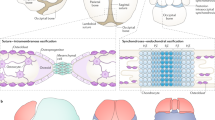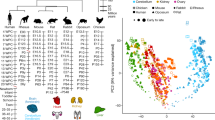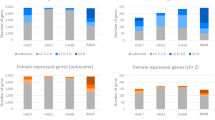Abstract
INTEREST in the function of the endocrine glands during embryonal development in vertebrates arose in connexion with investigations of the role of endocrine factors in the metamorphosis of the Amphibia. Many investigations carried out after thee first experiments of Gudernatsch (1909-12) on this problem at the middle of the year 1930 gave sufficiently convincing evidence on the morphogenetic character of endocrine action on the process of larval development of Amphibia. The technical difficulties of endocrine experiments delayed the investigation of this problem in higher vertebrates. Evidence on the role of endocrine factors in the embryonal development of mammals and humans was based mainly on the definite function of the endocrine glands in the embryo: the morphological signs of physiological functional ability, the hormonal contents in the gland, and observations of disorders in the development of the embryo and embryonal abnormalities in the presence of a disorder in the endocrine system. On the basis of these facts, Thomas1 advanced the opinion that the endocrine glands of higher vertebrates and humans do not act as morphogenetic factors in development during early embryonal stages. Their influence on embryonal development starts only during the later stages, and is of morphogenetic character, that is, they either accelerate or delay the processes of development. However, the majority of endocrine glands, Thomas points out., although endowed with the ability to function at the end of embryonal development, begin their activity only in the post-natal period. This opinion was generally accepted, and the first experiments on embryos were carried out from this point of view.
This is a preview of subscription content, access via your institution
Access options
Subscribe to this journal
Receive 51 print issues and online access
$199.00 per year
only $3.90 per issue
Buy this article
- Purchase on Springer Link
- Instant access to full article PDF
Prices may be subject to local taxes which are calculated during checkout
Similar content being viewed by others
References
Thomas, E., "Handb. d. inn. Sekretion", 2, 1291 (M. Hirsch, 1933).
Ancel, P., Conférences du Col. de Fr. Colloque intern. 10–19. Juin 1937. Les hormones sexuelles, C.R., 185 (1937).
Fugo, N. W., and Witschi, E., Acta biol. latvica, 8, 73 (1938).
Studitskii, A. N., Arch. russ. d'anat., d'histol. et d'embry., 18, 147 (1938).
C.R. Acad. Sci., URSS., 20, 493 and 497 (1938).
Bull. Acad. Sci. l'URSS., Cl. d. sci. biol., 1 (1941).
J. Gen. Biology (Russian), 2, 19 (1941).
Arch. russ. D'anat., d'histol. et d'embry., 27, 143 (1941).
Benazzi, M., Arch. ital. Anat., 27, 296 (1929).
Studitskii, A. N., C.R. Acad. Sci. URSS., 27, 86 (1940).
Adv. in Mod. Biol. (Russian), 13, 41 (1940).
Fugo, N. W., J. Exp. Zool, 85, 271 (1940).
Martindale, F. M., Anat. Rec., 79, 373 (1941).
Landauer, W., Anat. Rec., 64, 267 (1936).
Jaffe, H. L., et al., Proc. Soc. Exp. Biol. and Med., 28, 174 (1930).
Author information
Authors and Affiliations
Rights and permissions
About this article
Cite this article
STUDITSKII, A. ENDOCRINE CORRELATION IN THE EMBRYONAL DEVELOPMENT OF THE VERTEBRATES . Nature 157, 427–430 (1946). https://doi.org/10.1038/157427a0
Issue Date:
DOI: https://doi.org/10.1038/157427a0
This article is cited by
-
Die Beziehungen der Entwicklungsphasen und des Funktionszustandes der innersekretorischen Dr�sen zu den Wachstumsstufen des H�hnerembryos
Wilhelm Roux' Archiv f�r Entwicklungsmechanik der Organismen (1957)
-
Die Beziehungen der Entwicklungsphasen und des Funktionszustandes der innersekretorischen Dr�sen zu den Wachstumsstufen des H�hnerembryos
Wilhelm Roux' Archiv f�r Entwicklungsmechanik der Organismen (1956)
-
Histogenese und Funktionszustand der embryonalen H�hnerthyreoidea
Zeitschrift f�r Zellforschung und Mikroskopische Anatomie (1956)
-
Chondrodystrophy (Achondroplasia) and Humoral Agents
Nature (1946)
Comments
By submitting a comment you agree to abide by our Terms and Community Guidelines. If you find something abusive or that does not comply with our terms or guidelines please flag it as inappropriate.



